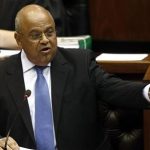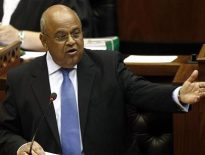By Una Galani
DUBAI, April 16 (Reuters Breakingviews) – Egypt’s search
for a successor to Hosni Mubarak is losing credibility. A move by the authorities to bar 10 of the 23 candidates, including
three top contenders, could reshape the presidential election just five weeks before the polls start. This will add to the
concerns of investors who should worry more about a timely, free vote than about who actually ends up in charge of the
country.
addresses the nation on Egyptian State TV in this still image taken from video, February 1, 2011. REUTERS/Egyptian State
TV
Liberals won’t mourn the loss. The Muslim Brotherhood’s primary nominee Khairat
al-Shater, popular hard-line Salafi preacher Hazem Salah Abu Ismail, and Mubarak’s former chief spy Omar Suleiman were among
those kicked out the race, pending appeals, by the election commission. Past criminal convictions, citizenship problems and
some technicalities were given as reasons for disqualification.
But this mass ouster from the candidates’ ranks is a
mixed blessing for foreign investors. True, they may have some reason to rejoice. The election of Abu Ismail would stoke
fears about the impact of ultra-conservative Islam on the economy. That of Suleiman would raise concerns of corruption from
the old guard. A win by al-Shater, meanwhile, would consolidate power in the hands of one party, following the Brotherhood’s
dominance of parliamentary elections.
Their exit leaves room for more market-friendly moderates like Amr Moussa, a
former Arab League secretary general, or ex-Brotherhood member Abdul Moneim Abol Fotouh, who was expelled from the movement
for launching his own presidential bid last year. The Brotherhood also has a reserve nominee who made the list, but he may
find it hard to mobilise support for a replacement at such a late stage.
That’s where Egypt’s election risks coming
unstuck. These disqualifications, after nominations have closed, will deprive key factions of the opportunity or time to
rally support for alternative candidates. And it will leave a question mark over those, if any, that are reinstated. Under
the current timeline, the work on a new constitution is unlikely to be finished before the elections. Without it, no one can
be sure of the ultimate balance of power between the president and parliament.
The Muslim Brotherhood is currently
blocking much-needed financial aid from the IMF until the army hands over more power, something it has pledged to do by the
end of June. Egypt’s election turmoil increases the chance of a disputed vote, or of a delay that would prolong the
country’s financial uncertainty.
CONTEXT NEWS
– Three top contenders for Egypt’s presidency were disqualified
on April 14 on technical grounds
– Farouk Sultan, head of the presidential election commission, told Reuters a total
of 10 of the 23 candidates had been disqualified from the race.
– Hazem Salah Abu Ismail, the Salafi, was disqualified
because his mother held U.S. citizenship, the state news agency reported. The Muslim Brotherhood’s primary nominee Khairat
al-Shater was barred due to a past criminal conviction. Omar Suleiman, the former intelligence chief to Hosni Mubarak was
also disqualified.
– All three have 48 hours to appeal to the state election committee against their
exclusion.
– Voting is due to begin on May 23 and a run-off vote will take place in June. The army has pledged to hand
power to the new president by July 1.
– A poll by Egyptian daily Al Masry Al Youm published on April 14 showed that
almost 40 percent of voters remain undecided over who to elect.
– Reuters: Top contenders fight to stay in Egypt
election





